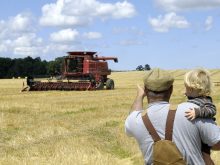The situation is not quite as portrayed at Saskatchewan Pulse Growers.
According to sources, the resignation of chair Murray Purcell, followed closely by the resignation of longtime executive director Garth Patterson, is not a coincidence.
While they may not be talking about it, and while the official news releases provide no signs of internal bickering, some major areas of disagreement have developed within an organization that has been a model of success.
Purcell, a farmer from Pike Lake just outside of Saskatoon, loved being a director on the SPG board and he took the position of chair seriously. He spent a tremendous amount of time on SPG business and he didn’t leave just because he wanted to pursue other interests.
Read Also

Crop profitability looks grim in new outlook
With grain prices depressed, returns per acre are looking dismal on all the major crops with some significantly worse than others.
Patterson has been the driving force behind the SPG for the past 16 years, helping make Canada a dominant world exporter of lentils and peas.
Millions of dollars flowing into the organization annually through the mandatory checkoff has resulted in a well-funded research program. New varieties have been provided to farmers at a relatively low cost through the University of Saskatchewan’s Crop Development Centre.
Saskatchewan had 3.3 million acres of lentils last year, compared to a meager 140,000 acres in Alberta. The SPG is one of the main reasons why Saskatchewan has captured this opportunity.
Patterson has jumped to the Western Grains Research Foundation, and he’ll no doubt enjoy that challenge. The WGRF has always received its wheat and barley checkoff funding as a deduction from Canadian Wheat Board final payments. With the CWB’s single desk selling authority set to end Aug. 1, 2012, a whole new funding model will need to be developed.
WGRF’s Endowment Fund has also received millions of dollars as the result of the railways exceeding their revenue cap. The organization has the resources to really make a difference in agricultural research.
Perhaps a new executive director will end up being good for SPG, but the new person will have big shoes to fill. If there are major differences of opinion among the directors, it might be a difficult job.
I attended the U of S’s agriculture college with Patterson as well as new SPG chair Lee Moats of Riceton. Moats had a great career as an agrologist before concentrating on his farming operation, but it’s rare to see someone become the chair of SPG after only half a year as a director.
Another organization and another college classmate also figures into the mix. Gord Bacon leads Pulse Canada in Winnipeg, which receives a lot of its funding from SPG. In the past, there have often been differences of opinion on which organization should be taking the lead on specific issues. That may or may not figure into the current situation.
In addition to Moats, the SPG board includes Dwayne Moore of Rosetown, David Nobbs and Morgan Nunweiler of Kindersley, Dan Flynn of Beechy and Vicki Dutton of Paynton.
Elections for farmer boards and commissions are often low-key affairs. A lot of producers don’t research the candidates and return the mail-in ballots. The regular SPG election this fall will be important. Good people are needed to keep the organization moving forward.
SPG has a huge Pulse Days meeting each January in Saskatoon as part of Crop Production Week, but a lot of producers don’t attend. It’s our money and we should pay more attention.
Kevin Hursh is an agricultural journalist, consultant and farmer. He can be reached by e-mail at kevin@hursh.ca.















